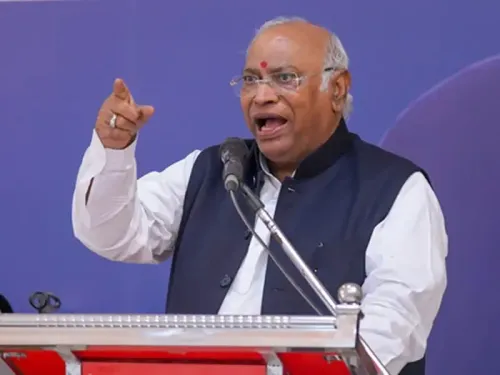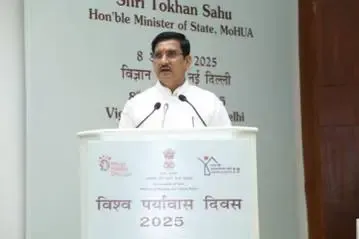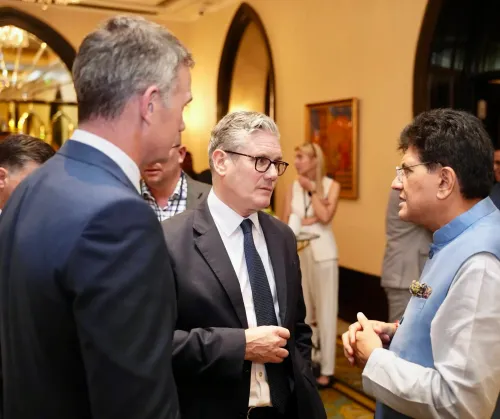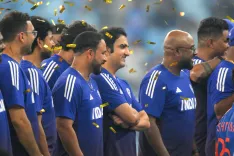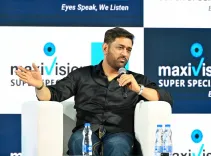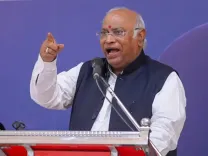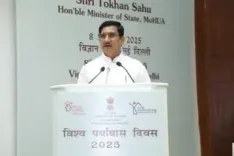How Do Mamata’s Twists and Turns Keep the Opposition Guessing?
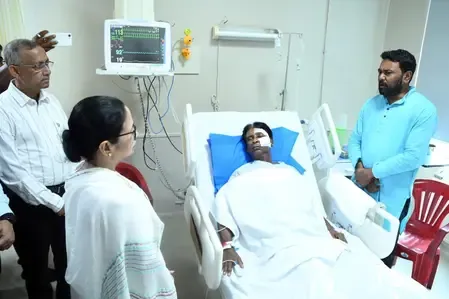
Synopsis
Key Takeaways
- Mamata Banerjee exhibits a unique political style marked by unpredictability.
- Her approach often shifts in response to public sentiment and criticism.
- Recent events show her ability to blend empathy with political strategy.
- North Bengal remains a crucial battleground for the TMC.
- Public pressure frequently influences her political decisions.
New Delhi, Oct 8 (NationPress) Mamata Banerjee's political maneuvers are characterized by an air of unpredictability. Her seemingly haphazard, yet meticulously calculated statements have left her opponents in a state of confusion, while her supporters celebrate her actions.
On Tuesday (October 7), the Chief Minister of West Bengal made a significant appearance at a Siliguri hospital to visit BJP MP Khagen Murmu, who had recently suffered injuries while en route to flood-affected regions in North Bengal. The optics of this visit were striking.
Despite being criticized by rivals for being combative and dismissive, she showed a softer side by inquiring about Murmu’s health and reassuring him of government support.
She informed the media that while Murmu had injuries near his ears, he was stable, though his blood sugar levels needed monitoring. Just a day prior, she was seen at a Durga Puja celebration in central Kolkata, where she joined celebrities in an impromptu dance amidst a festive atmosphere, even as North Bengal faced devastating floods and erosions, resulting in loss of life and property.
Adding to her challenges was a video showing the injured MP, with blood on his face, alongside fellow injured BJP MLA Shankar Ghosh. Yet, Mamata remained steadfast, countering criticism with a photo opportunity with Murmu. This isn't the first time she has displayed a dramatic shift in her political approach—her responses often oscillate between being spontaneous and strategic.
Throughout her career, she has demonstrated a tendency for unexpected changes in tone and tactics, often catching both friends and foes off guard. Following the tragic rape and murder of an intern at R.G. Kar Medical College and Hospital in Kolkata in August 2024, the administration's initial response was to downplay the incident as a suicide.
However, Mamata termed the outrage as politically motivated, branding it a “conspiracy” aimed at destabilizing her administration.
This reaction fueled public outrage, especially among the medical community, leading to strikes and widespread protests across Bengal. As the situation escalated, she adjusted her position, labeling the act a “heinous crime” and promising strict measures. She invoked the Aparajita Bill passed by the Bengal Assembly, which aimed for the death penalty in rape-murder cases, criticizing the central government for delaying its approval.
Following a local court's decision to sentence the perpetrator to life in prison, Mamata publicly demanded capital punishment, stating it was a rare and severe crime. In the 2012 Park Street rape case, she initially dismissed the survivor's allegations as false and politically driven. However, after public outcry and media attention, she reversed her stance, met with the survivor, and pledged justice.
During the COVID-19 pandemic's onset, she faced allegations of downplaying the situation. Yet, as case numbers surged, she shifted her approach, personally marking social distancing indicators on roads and visiting hospitals, re-establishing herself as an engaged leader.
Similarly, amid the post-poll violence of 2021, she initially dismissed reports as exaggerated. But with intervention from the Calcutta High Court and human rights organizations, she softened her tone, announced compensation, and promised action, emphasizing a pattern of denial followed by reluctant acknowledgment.
Last year, when accusations of sexual violence and land grabs involving local TMC leaders in Sandeshkhali emerged, her first reaction was to blame the BJP for conspiracy. However, as protests intensified and women's voices gained traction, she was compelled to distance herself from the implicated leaders, ultimately ordering arrests.
This incident highlighted how public pressure often forces her to adapt her stance.
In her recent hospital visit, opinions vary; some view it as a display of empathy, while others interpret it as a calculated political maneuver.
North Bengal has been a challenging region for the TMC, with the BJP making significant gains. Murmu, a tribal leader, represents a crucial demographic, and her outreach aims to convey a message of solidarity across party lines, a move that critics argue holds substantial symbolic significance.

